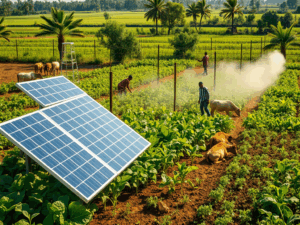In recent years, science and biotechnology have revolutionized agriculture, providing innovative solutions to some of the most pressing societal challenges. From increasing crop and animal yields to developing disease-resistant varieties, biotechnology has been at the forefront of efforts to ensure food security, improve livelihoods, and sustain our environment. However, as we embrace these advancements, it is essential to maintain a cautious approach, particularly when it comes to human health and safety.
The Benefits of Biotechnology in Agriculture
Biotechnology has offered remarkable benefits in agriculture, leading to the development of genetically modified organisms (GMOs), bio-fortified crops, and environmentally friendly pest control methods. These innovations have enabled farmers to produce more food on less land, reduce the need for chemical inputs, and improve the nutritional quality of crops. For instance, genetically modified maize and cotton is becoming staple crops in some African countries, providing higher yields and greater resistance to pests and diseases. Similarly, bio-fortified crops, such as Vitamin A-enriched sweet potatoes, have played a crucial role in combating malnutrition in vulnerable populations.
Beyond crop production, biotechnology has also contributed to the development of sustainable farming practices. Innovations such as precision agriculture and gene editing have allowed farmers to optimize resource use, reduce waste, and minimize their environmental footprint. These advancements are not only vital for feeding a growing global population but also for protecting the planet for future generations.
Ethical Considerations: No Humans as Guinea Pigs
While the benefits of biotechnology in agriculture are undeniable, it is imperative to approach its application with caution. One of the most significant ethical concerns is the potential impact of biotechnological products on human health. It is crucial to ensure that these products are thoroughly tested and proven safe before they are introduced into the food supply or environment.
Human beings should never be used as guinea pigs in the testing of biotechnological products. The responsibility lies with scientists, regulators, and policymakers to ensure that rigorous safety protocols are followed and that the long-term effects of these products are fully understood before they reach the market. The precautionary principle must guide the development and deployment of biotechnological innovations in agriculture. This principle emphasizes the need to avoid actions that could cause harm, particularly when scientific evidence is uncertain.
The Importance of Long-Term Evaluation
The long-term outcomes of biotechnological products cannot and should not be determined in a hurry. While short-term studies may show promising results, it is only through prolonged observation and research that the true impact of these products on human health, the environment, and society can be understood. Rushing the approval and deployment of biotechnological products without adequate long-term evaluation could lead to unintended consequences that may be difficult to reverse.
Furthermore, the complexities of ecosystems and human biology mean that even small changes introduced by biotechnological products can have far-reaching and unpredictable effects. Therefore, a cautious and measured approach is necessary, with ongoing monitoring and research to identify and address any potential risks.
Conclusion
Science and biotechnology have undoubtedly contributed to solving many of the challenges facing agriculture and society today. However, as we continue to explore the potential of these technologies, we must do so with a commitment to safety, ethics, and long-term evaluation. The promise of biotechnology should not come at the expense of human health or environmental integrity. By ensuring that biotechnological products are rigorously tested and their long-term effects thoroughly understood, we can harness the power of science for the betterment of all, without compromising our safety or well-being.




